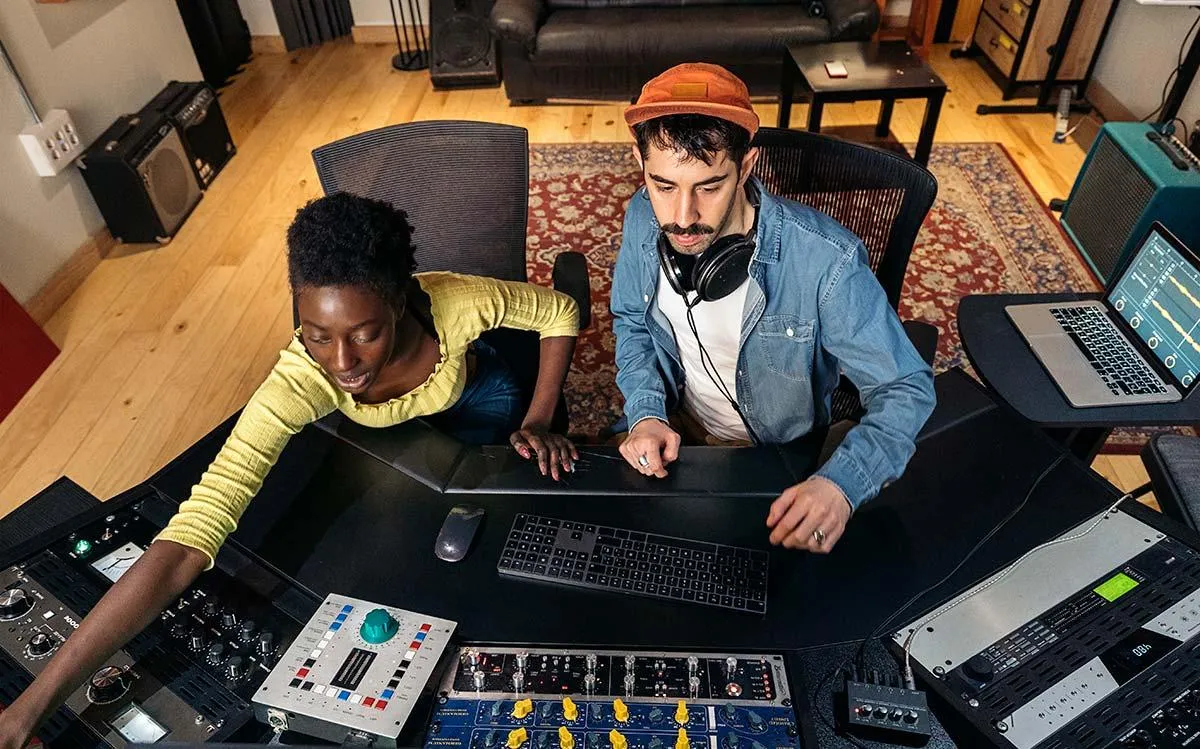Philly Recording School Blog
25 Years of Excellence
How to Build a Portfolio as an Audio Engineer or Producer: A Complete Guide
by illiad | March 31, 2025

Building a strong portfolio is crucial for aspiring audio engineers and music producers. It showcases your skills and helps attract clients and collaborators. Whether you're starting or advancing, a well-curated portfolio is key to standing out in the competitive music industry.
At Philly Recording School, we’ve helped many students build their portfolios and launch successful careers. This guide will walk you through the essential steps to create a portfolio that highlights your abilities and sets you up for success.
What Should Be Included in Your Portfolio?
When building a portfolio as an audio engineer or music producer, you want to ensure it truly reflects your skills and expertise. Here are the key elements every portfolio should include:
Introduction/Overview: A brief bio highlighting your experience and specialization.
Audio Samples: Showcase your best work, including a variety of tracks to demonstrate your range.
Project Descriptions: Explain your role, challenges, and techniques for each sample.
Client Testimonials: Positive feedback from artists or clients adds credibility.
Skills and Equipment: List the software (e.g., Pro Tools, Ableton) and gear you're proficient with to show
technical capability.
Quality Over Quantity: Choose Your Best Work
It’s tempting to include every project you’ve worked on, but remember that your portfolio should reflect your best work. Choose the projects that showcase your skills at their highest level. Don’t be afraid to be selective. A smaller number of excellent tracks or projects is far more effective than a large collection of mediocre work.
As an audio engineer or music producer, it's important to highlight the diversity of your skills. Whether you’re working on hip-hop production, rock mixing, or sound design, show that you can excel in different areas. This demonstrates your versatility to potential clients.
Network and Collaborate to Expand Your Portfolio
Building a portfolio isn’t just about the work you do alone. Collaborating with artists, producers, and other professionals in the music industry can help expand your experience and diversify your portfolio. Working with others also helps you learn new techniques and gain insight into different genres and production styles.
Philadelphia has a thriving music scene, and Philadelphia's premiere audio engineering and music production school provides plenty of opportunities to collaborate with fellow students and industry professionals. Whether it’s interning at a studio or teaming up with a local band, hands-on experience is crucial. The more people you work with, the more your portfolio will grow.
A standout example in the city is Lil' Drummer Boy Recordings. For 25 years, Li' Drummer Boy Recordings has been the go-to studio for artists and a top school for aspiring engineers. Record with industry-quality sound or master the craft of music production—your creative vision starts here. With a legacy of excellence and a reputation for fostering talent, this studio offers both professional-grade recording and comprehensive training programs that can take your portfolio to the next level.
Create a Professional Website for Your Portfolio
In today’s digital age, having an online presence is essential. A well-designed website makes it easy for potential clients to view your work, listen to your tracks, and get in touch. Your website should be user-friendly, mobile-responsive, and showcase your portfolio in a clean, organized way.
Your site should include:
An About Me page with your bio
A Portfolio section with your audio samples
A Services page outlining what you offer (mixing, mastering, production, etc.)
A Contact form so potential clients can easily reach out
Additionally, make sure your website is optimized for search engines by including relevant keywords like audio engineer, music producer, recording studio, and music production. This ensures your site is discoverable by those searching for audio services in your area.
Update Your Portfolio Regularly
As you gain more experience and work on new projects, it’s important to keep your portfolio up-to-date. Fresh content shows that you're active and continuously evolving in your field. Regular updates also ensure that your portfolio stays relevant to current trends in music production and engineering.
At Philly Recording School, we encourage our students to update their portfolios as they progress through their courses. With new projects, collaborations, and techniques under your belt, your portfolio should reflect that growth.
Lil' Drummaboy Recordings
818 South Street, Philadelphia, PA 19147
Tel: (215) 574-1400

